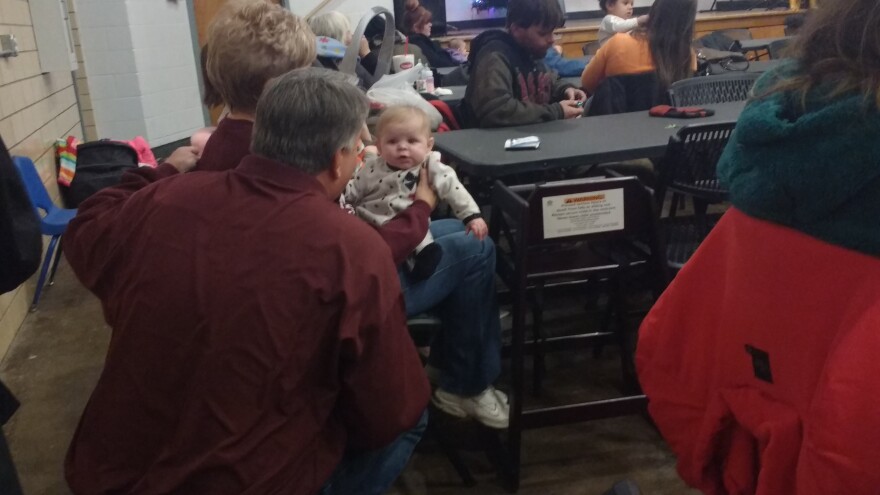To Heidi, Ethan, Dakota, and Megan Shotts, plus their four other siblings, this is just another ordinary Thursday night dinner. The kids are laughing and playing around a long folding table. Heidi, who turns six today, chows down on some pizza and shakes her strawberry blonde hair.
“Pizza. I like pizza,” Heidi says.
The kids are in an old school gym, surrounded by rows of folding tables and people. This doesn’t seem to be a particularly special dinner.
But the kids’ parents say it was a seemingly ordinary dinner like this that helped them start to put their life on track.
Their father, James Shotts, tells me that first dinner was about a year ago.
“We’ve been coming here for almost a year now. Every Thursday,” Shotts says.

“Here” is the Fairbanks, a maroon brick building on the corner of Broadway Ave and Scott Street in north Springfield’s Grant Beach neighborhood.
Originally built as a public school in 1906, the Fairbankswas purchased in 2013 by The Blansit Investment Group, LLC to create a community betterment center.
Fairbanks' programs like the community dinners, which gained traction prior to the city's Zone Blitz launch earlier this year, have earned recognition by local officials and received public and private support.
In addition, grants like the Northwest Project have signaled a significant investment in Zone 1. Initially based at the Fairbanks, the goal of the grant is to pilot strategies over a five-year period to help families overcome various challenges.
Shotts explains that he, his wife, and eight kids live within walking distance of the Fairbanks. Since they first came to Thursday night community dinners, the family has taken advantage of the personalized educational programming offered by the center, particularly financial education.
“They helped us get our budgeting straightened out so we can have money at the end of the month instead of just living day to day,” Shotts says.
He explained that, through the help from the Fairbanks, his wife got a job and the family found affordable daycare for their six-month old, among other things. And he still has plans for self-improvement.
“Like you make goals and they help you accomplish them, like things you need to do. I’m actually going to get my GED now,” says Shotts.
Life still isn’t easy, but Shotts says he feels like he has his head above water now. He smiles at his 9 year old son, who’s running around the table. “Biggest struggle, just organizing how many kids I got. Getting them all to listen. And sit still.”
Amy Blansit, who is a co-founder of the Fairbanks, explains these Thursday night community dinners were created to promote a neighborly feel.
“It really is about re-developing the idea of the front porch. I know my neighbor, I have someone to call on if something happens,” says Blansit.
The dinners are followed by educational programs that change every week, depending on the season.
“Tonight we’re going to talk about winterization,” she says.

But Thursday night dinners aren’t just for struggling families, they’re open to anyone.
Blansit says, “If someone for the community comes and they’re just here to create community and assist us in what we do, they can become an ally.”
When Blansit says allies, her smile gets a little wider.
Allies are volunteers who serve as companions to families living in Grant Beach, accompanying them to things like doctor’s appointments and meetings. Many times those families, like the Shotts, got connected with the Fairbanks through Thursday night community dinner.
Blansit says that right now, there are two groups of about 15 families who have at least one ally.
Before working as an ally, volunteers go through training.
“One of the first things that we train our allies is the hidden rules of poverty and middle class. There are so many times we think we know everything about someone’s situation, and [people say] ‘because I’m middle class I’m going to tell you how to do things and you should do them,’” Blansit says.
After the ally is trained, the Fairbanks carefully pairs allies with each family, based on needs.
Although allies are invaluable in helping families who live in Grant Beach, Blanist says the program is just as much about educating the ally.
“There’s a fear, there’s a misconception, the things we don’t understand we begin to assume a lot about them, so it’s amazing to have people come sit with us who have never experienced poverty. And walk away like, oh.”
Beth Hersh and her husband have been paired with the Shotts family. Hersh loves doing it, but admits that it was a little overwhelming at first.
“When you walk in, and you’re like, ‘Eight kids, good grief!’ that’s a lot of kids! But you get to know them, you get to love them all,” Hersh says.
Hersh explains that she and her husband are committed to stay as allies with the family for 18 months. She says she’s so proud of the progress the family has made so far.
“They’ve worked a budget, they’ve stayed on budget, they’ve even put money in a savings account. They are paying off a loan that they have, they’re moving towards getting another house,” Hersh says.

I watch as Hersh serves slices of pizza to the Shotts family and cuddles with their 6-month old baby.
It looks like an ordinary Thursday night dinner. But it’s clear in Hersh’s smile and the peaceful expression on her face that this is so much more.
Editor's note 12/30/16: We’ve amended our original post from Dec. 29 to accurately contextualize the funding model for the Fairbanks and its connection to the Northwest Project.


